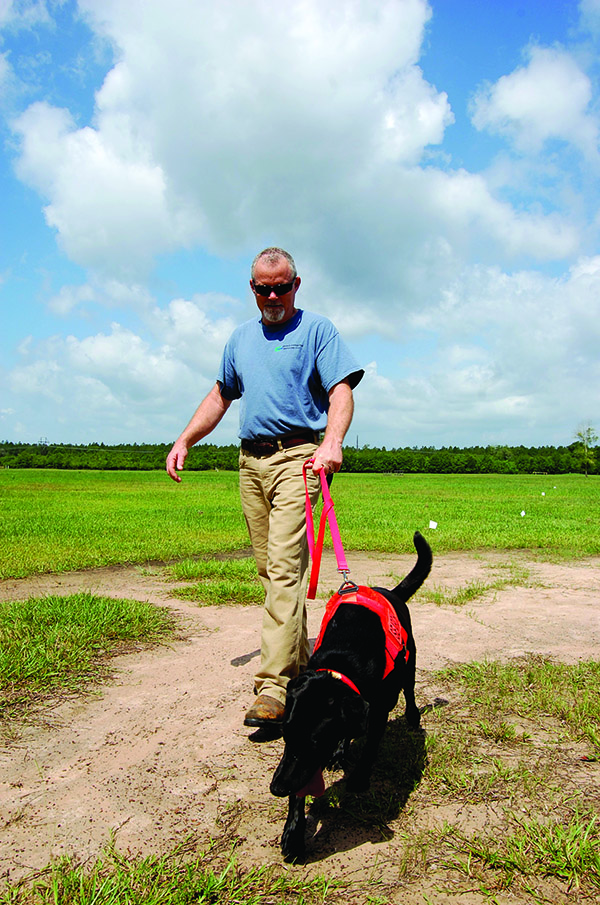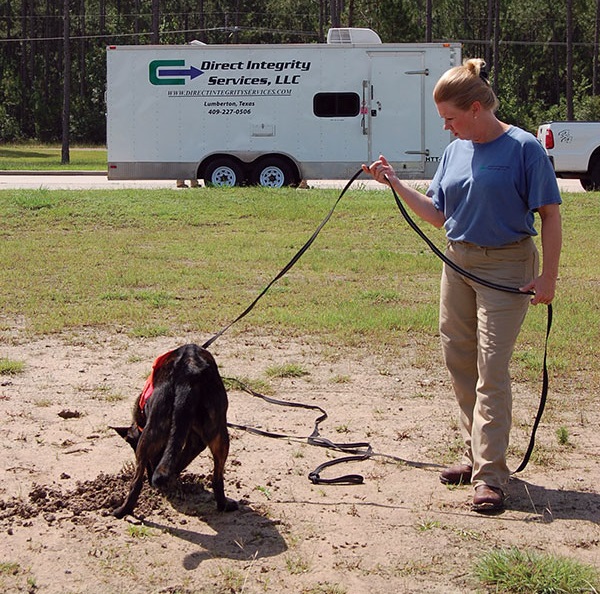September 2018, Vol. 245, No. 9
Features
Leak Detection Going to the Dogs
By Joe Hollier, Editor
The nearly two-hour drive to Direct Integrity’s (DI) headquarters, located just outside Beaumont, Texas, flew by quickly. Luckily, the interstate traffic east out of Houston was light because I was eager to learn more about DI and their unusual leak detection capabilities. We first crossed paths at the Pipeline Pigging and Integrity Management Conference (PPIM) held earlier this year.
As mentioned in my Editor’s Notebook (Page 2), I am a big proponent of working dogs, especially retrievers. In my lifetime, I have owned a total of seven retrievers, five Labradors and two Boykin spaniels. All were trained to be working retrievers and all were very good at their job. And even though they all had the same job, retrieving, they each had their own style.
My current retriever, Roux, is a gorgeous, 11-month old chocolate female Labrador, obsessed with bringing me anything that isn’t nailed down. Getting her to retrieve what’s important, birds and not my wife’s socks and unmentionables, is a challenge but it’s a learning process that is improving. Her personality is irresistible and her desire to please is what makes her and other working dogs special to their profession.
Today, dogs can perform a multitude of services including, protection, therapy, rescue, herding, tracking and detection to name a few. They can be trained to detect virtually anything, explosives, drugs, bedbugs, even cancer. So why not pipeline leaks?
DI’s primary business is hydro-testing and mechanical leak detection, but the company also offers several services including hydrostatic and pneumatic testing, SF6 and canine leak detection along with cleaning, drying and de-watering. Their canine leak detection services are what piqued my interest to learn more.
Roger Clark, vice-president of DI, says his experience in the industry has led him to a few opinions when it comes to safely monitoring a pipeline. One of them is, “more is better.”
“The more ways you can check a high-pressure pipeline for reliability and ensure its integrity the better, says Roger. “Companies that inspect their pipelines inside and out by using a multitude of processes tend to have higher safety ratings than their peers. When it comes to monitoring and ensuring the safety of your pipeline, redundancy really pays off,” he adds.
One testing redundancy Roger is referring to is the use of his canine employees. DI employs six dogs for leak detection: four shepherds and two Labradors. Roger’s wife, Sheri, joined the company recently as Kennel-Master and is responsible for the well-being and training of their four-legged employees. Sheri’s 17-years of experience as a veterinarian technician makes her an ideal caregiver for the dogs.
DI’s dogs are trained to detect an odorant that is non-toxic, non-hazardous, non-corrosive, non-flammable and does not require disposal. Sheri works with the dogs daily on retrieving the specialty scented balls.
All six of DI’s dogs have been trained to use an aggressive response (digging) when a leak is found. When working a right-of-way, a dog will begin to dig when it locates the specialty odor. Sheri is also tasked with keeping their human employees trained on how to handle their canine co-workers. “Consistency has been the key,” Sheri said. “Making sure the dogs have constant exposure to the odors and ensuring every handler knows how to communicate with every dog. Just like people, they all have different personalities and you must know how to work with each individual dog.
“They’re all awesome, we try and teach them to have the same manners, but just like people they all behave differently. We are currently working on the younger dogs because they do travel with us and must stay in hotels, so it’s in everyone’s best interest to have well-mannered dogs. They are still going to be dogs, they are going to stop and use the bathroom, they are going to stop and smell other scents from other animals, so it’s imperative our handlers be able to recognize the difference,” she added.
While I have a soft spot for Labradors, Roger said he has always been partial to Shepherds. Shama, the German Shepherd I met at PPIM, is their number one canine employee. She was initially trained for work in Germany, but when the overseas company backed out, it opened the door for DI to inherit a very smart dog that takes her cues in German and English. During the simulated test DI set up for me, Shama showed off her multilingual abilities by responding to commands in both languages.
You want a dog that will have a strong working drive and we have always had that with our Shepherds. But we are also having good success with our younger Labs (Gabby, George), too,” said Roger.
DI’s other dogs include Cokie, a 1-year-old female German Shepard and two Dutch Shepherds, Dana and Nova. “They are young and playful and still learning their obedience, but they have what matters most and that’s the love to work. The Labradors came from a company in Phoenix that was going out of business. They called and asked if we wanted them and we drove up and got them immediately,” said Roger.
The canine crew isn’t limited by location either. They have traveled all over the U.S. including Alaska, and they’ve had requests from Mexico and other countries, but Roger says they stay plenty busy here, without having to travel out of the country.
“We drive everywhere we go,” said Roger. “It is easier on the dogs and it allows us to take as many dogs as needed, depending on the size of the job. When we first started, it was a little slow and new to everybody. We had to convince people of what the dogs were capable of but once we began showcasing the dog’s abilities through the demos it became a lot easier.”
When on a jobsite the dogs work in pairs and can generally cover between five and seven miles per day. On larger jobs, the dogs are rotated often so they do not get overheated or overworked. DI recently purchased and outfitted a commercial-sized van and turned it into a deluxe canine-cruiser, capable of carrying six dogs, including handlers. “The van is great because we can rotate dogs much easier and be able to keep them cool during the hot summer months,” Sheri said.
For potential customers, DI sets up demonstrations to prove the dog’s abilities. The specialty scented rubber balls are placed in an airtight container and then sent to the customer. The customer then buries the balls on their right-of-way. The DI team shows up several days later and begin working the area with the dogs, where the balls were buried. When the dog recognizes the odor, he begins digging for his reward ... the ball.
Last month, DI and its team drove to Florida to put on a demonstration for a prospective client.
“The dogs nailed every single spot, and we came home with a new contract,” said Roger. “We are used to what the dogs can do, but it is a big eye-opener for our customers when they see the success the dogs have when they go to work. The dogs make it look easy and can be a big saver in costs, because there isn’t as much labor involved.
“Normal leak detection requires a lot more ground probing and is more labor intensive. The biggest advantage for using the dogs is it is so much faster, and for our customers it really comes down to speed. On a job site you can spend two days probing for holes but with the dogs you don’t have to do that,” said Roger.
While the K-9 detection makes up only 10% of DI’s leak detection business, requests for the dogs have been increasing. The company attends several conventions each year showcasing their equipment and dogs. Sharma is the dog of choice in these environments as she is more seasoned, skilled and the best mannered of the DI pack.
Using dogs for leak detection isn’t new, but as more and more companies try to reach their goal of zero incidents, multiple methods of leak detection is a necessity and using dogs that can smell in parts per billion could pay off. P&GJ
Direct Integrity’s office is in Lumberton, Texas, and can be reached at www.directintegrityservices.com.







Comments